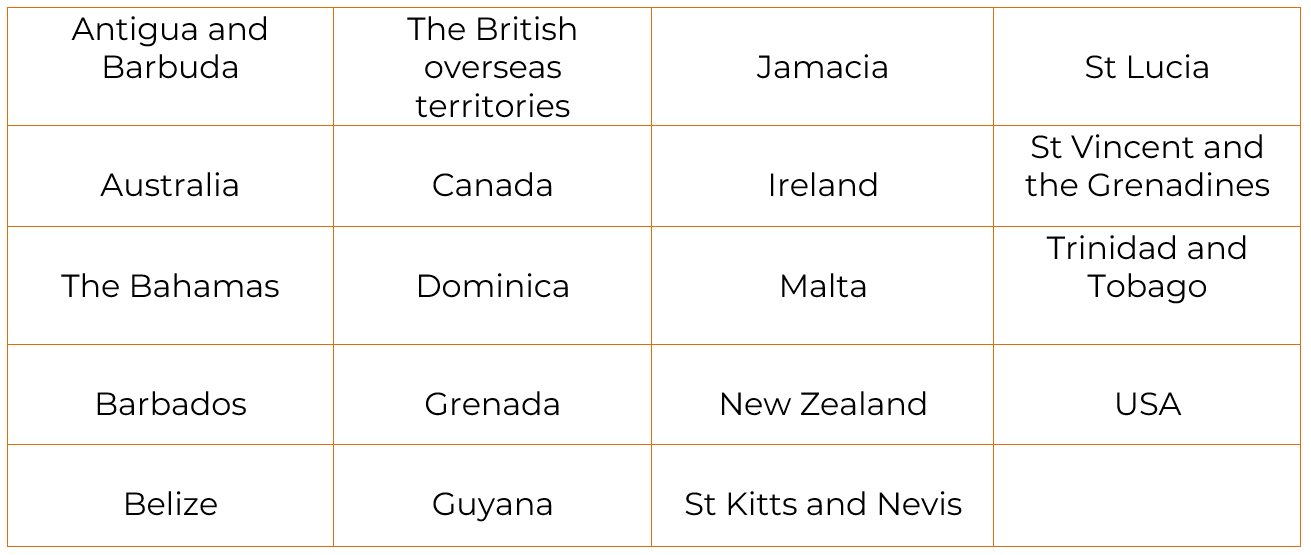
This article, which is the second in a miniseries on how to obtain a British passport, focuses on Naturalisation as a British Citizen.
British citizenship can be acquired in 3 ways: automatically by birth, by registration, or through the process of naturalisation.
To be a British citizen at birth, either of the following conditions must be met:
- Your mother was a British citizen or settled in the UK; or
- Your father was a British citizen or settled in the UK and was married to your mother at the time of your birth
To register as British citizen, one of the following conditions must be met at birth:
- Neither of your parents were British citizens or settled in the UK;
- Your father is a British citizen or settled in the UK, and he was not married to your mother; or
- You must not have spent more than 90 days outside the UK in each of the first 10 years of your life.
If you are married to a British citizen, you can apply immediately upon receiving settled status/Indefinite leave to remain (ILR) and are not required to wait for 12 months before submitting your application.
British Citizenship by naturalisation
The most common way to register as a British citizen is through naturalisation.
To naturalise as a British citizen, you must:
- be 18 or over
- have held ILR (link to other article) or EU settled status for at least 12 months prior to making the application
- prove your knowledge of English, Welsh or Scottish Gaelic
- have passed the life in the UK test
- intend to continue living in the UK
- be of good character
- not have spent more than 450 days outside the UK during the 5 years prior to making your application (if not married to a British citizen); and not have spent more than 90 days outside the UK in the last 12 months
- not have broken any UK immigration laws (for example living illegally in the UK)
Life in the UK Test & English language
To acquire British citizenship, applicants must demonstrate their knowledge of the English language and life in the UK. These requirements aim to ensure that individuals have a sufficient understanding of the language and the fundamental aspects of British society and culture.
The language requirement typically involves passing an English language test approved by the Home Office, which assesses an applicant's speaking and listening skills; or having a degree taught or researched in English. There are exemptions for individuals from certain countries and those with specific qualifications or disabilities.
To prove your knowledge of English via an English test, you can take a recognised English test qualification from an approved test centre. It is necessary to possess a certificate confirming your qualification or have online access to your test results.
You can only use English for Speakers of Other Languages (ESOL) qualifications if they’re on the list of approved tests. You cannot use other qualifications, for example GCSEs, A levels or National Vocational Qualifications (NVQs).
If you wish to evidence your knowledge of English by having a degree in/taught in English; unless your degree is from a UK university; you must provide:
- a copy of your degree certificate
- an Academic Qualification Level Statement (AQUALS) from Ecctis(formerly UK NARIC) confirming the degree is equivalent to a UK qualification.
If your degree is from a non-majority English-speaking country, you’ll also need an English Language Proficiency Statement (ELPS) from Ecctis confirming the degree was taught in English.
You will not need to prove your knowledge of English if you’re a citizen of:

Regarding the life in the UK requirement, applicants must pass the Life in the UK Test. This test examines knowledge of British history, traditions, governance, and societal values. It covers topics such as government, laws, customs, and notable historical events.
Demonstrating proficiency in English and knowledge of life in the UK through these tests is a mandatory steps towards obtaining British citizenship.
Good character requirement
The good character requirement is a complex area which assesses an individual's moral conduct and adherence to the laws and values of the UK.
The disclosure of prior offenses and convictions in your British citizenship application is likely to have an impact, although this outcome depends on several factors, such as the nature of the conviction or offense. It is mandatory to disclose information about cautions, warnings, drink driving offences, fixed penalty notices, road traffic offences, civil judgments, civil penalties for illegal working, and any bankruptcy proceedings.
Factors such as compliance with immigration laws, payment of taxes, and involvement in the community are also considered. Home Office officials assess an individual's conduct and behaviour to determine if they meet the good character requirement.
It's important to note that the good character requirement applies to both the period leading up to the application and the decision-making process. Applicants should ensure they have a clear understanding of the requirement and provide accurate and truthful information throughout their British citizenship application.
Residence requirements
For the majority of naturalisation applications, the residence requirements include:
- Being in the UK at the beginning of the 5-year period ending with the date of the application
- Not being absent from the UK for more than:
- 450 days in that 5-year period
- 90 days in the period of 12 months ending with the date of application
- Not, on the date of application, being subject under the immigration laws to any restriction on the period of stay in the UK
- Not, at any other time in the 12-month period ending with date of application, subject under the immigration laws to any restriction on their period of stay in the UK
- Not at any time in the period of 5 years ending with the date of application, in the UK in breach of the immigration laws
Discretion over an applicant’s presence in the UK at the start of the qualifying period in exceptional cases
Discretion should normally be exercised if one or more of the following criteria is met:
- The applicant was prevented from being in the UK because they had been removed from the UK, and the decision to remove them was later overturned
- The applicant was incorrectly prevented from resuming permanent residence in the UK following an absence
- The applicant is normally resident in the UK but there were exceptional reasons why they could not return from abroad at that time, such as illness, or travel restrictions due to a pandemic
- The applicant is a current or former member of the armed forces
Cases where the requirement can be met by the date of consideration
Applicants are expected to meet this requirement, but there may be cases where the person has inadvertently applied on a date when they did not. The application form will ask applicants to agree that the Home Office use a different date as the date of application, if this would work to their advantage.
Absences during the qualifying period
Where an applicant has spent more than the 450 days outside of the UK during the qualifying period the Home Office must consider exercising discretion if they meet the other requirements.
- Where the applicant exceeds the permitted absence by 30 days or less the Home Office must exercise discretion unless there are other grounds on which the application falls to be refused.
- Where the applicant has absences of between 480 and 900 days and otherwise meets the requirements you must only consider exercising discretion where the applicant has established their home, employment, family and finances in the UK, and one or more of the following applies:
- at least 2 years residence, without substantial absences immediately prior to the beginning of the qualifying period - if the period of absence is greater than 730 days, the period of residence must be at least 2 or 3 years respectively
- the excess absences are the result of:
- Postings abroad in Crown service under the UK government or in service designated under section 2(3) of the British Nationality act 1981.
- Accompanying a British citizen spouse or civil partner on an appointment overseas
- The excess absences were an unavoidable consequence of the nature of the applicant’s career, such as a merchant seaman or employment with a multinational company based in the UK with frequent travel abroad
- Exceptionally compelling reasons of an occupational or compassionate nature to justify naturalisation now, such as a firm job offer where British citizenship is a statutory or mandatory requirement
- The applicant was prevented from being in the UK because they had been removed from the UK, and the decision to remove them was later overturned
- The applicant was incorrectly prevented from resuming permanent residence in the UK following an absence
- The excess absences were because the applicant was unable to return to the UK because of global pandemic
Absences in the final year
The Home Office normally only exercises discretion for excessive absences during the final year of the qualifying period if the future intentions requirement is met.
Supporting documents for a UK citizenship application
When applying for British citizenship, it is necessary to provide a range of supporting documents. At a minimum, these documents should include proof of ID and nationality, proof of meeting the requirements for knowledge of Life in the UK and English language, evidence of your current UK residence, documentation confirming your valid ILR or settled status in the UK. Additionally, if applicable, you may need to submit documents pertaining to your marriage and earnings, especially if you are not paid via PAYE (Pay As You Earn).
These supporting documents are essential for verifying your eligibility and ensuring the accuracy of your application. It is important to gather the required documentation and ensure that they are up-to-date and valid. Providing comprehensive and authentic supporting documents will enhance the chance of a successful British citizenship application.
British citizenship processing times and fees
Naturalisation applications typically take around 6 months to be processed, although in some instances, the decision-making process may extend beyond this timeframe. Unfortunately, there is no option for expediting the application.
During the consideration of your application, you may keep your original passports and BRP cards, unless the Home Office request to have view of the originals (which is a rare occurrence).
The standard fee for naturalisation as a British citizen is £1,330. However, it is important to note that fees are periodically reviewed and adjusted by the Home Office. Additionally, there might be additional fees for services such as the Life in the UK Test (£50) or English language proficiency test (around £150).


